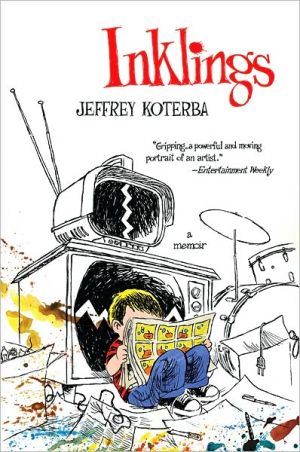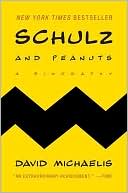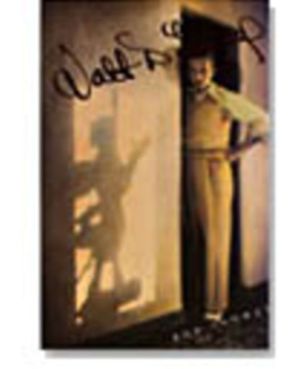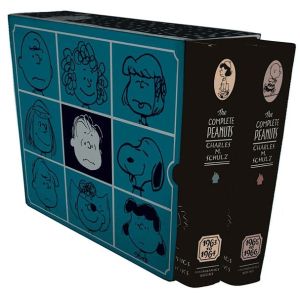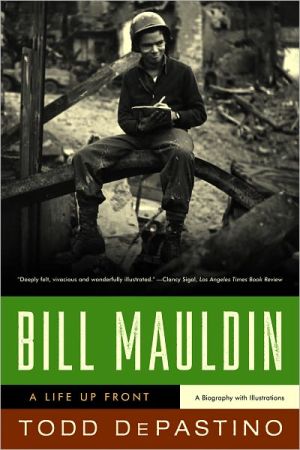Inklings
At age six, Jeffrey Koterba began drawing cartoons, creating with ink and white paper a clean, expansive refuge from the pandemonium surrounding him. The Koterba household was filled floor-to-ceiling with second-hand TVs and garage-sale treasures his father, Art, fixed and sold for extra money. A hard-drinking ex-jazz drummer whose big dreams never panned out, Art was subject to violent facial and vocal tics—symptoms of Tourette’s Syndrome, a condition...
Search in google:
At age six, Jeffrey Koterba began drawing cartoons, creating with ink and white paper a clean, expansive refuge from the pandemonium surrounding him. The Koterba household was filled floor-to-ceiling with second-hand TVs and garage-sale treasures his father, Art, fixed and sold for extra money. A hard-drinking ex-jazz drummer whose big dreams never panned out, Art was subject to violent facial and vocal tics—symptoms of Tourette’s Syndrome, a condition Jeffrey inherited—as well as explosions of temper and eccentricity that kept the Koterba family teetering on the brink of disaster. From the canyons of busted electronics, the lightning strikes, screaming matches, and discouragements great and small emerged a young man determined to follow his creative spirit to grand heights. And much to his surprise, he found himself on a journey back to his family and the father he once longed to escape. Inklings is an exuberant, heart-felt memoir infused with a uniquely irresistible optimism.Publishers WeeklyIn this honest memoir, Koterba, nationally syndicated political cartoonist and jazz musician, depicts a childhood burdened with both Tourette's syndrome and an eccentric, overbearing father. A failed musician, the older Koterba drank heavily and turned his frustrations on his family. He also had a part-time business repairing and selling televisions, which turned their Omaha, Neb., home into a Sanford and Son–style junkyard. Like his son, he suffered from Tourette's, which has a genetic component. The painfully shy Koterba struggled as a young man to escape the family chaos and follow his artistic inclinations. Koterba renders scenes of family dysfunction with an artist's feeling for nuance and detail. His psychic turmoil is portrayed with equal facility, and the junkyard house becomes a fearsome presence. However, the book lacks thematic unity. While Koterba offers a number of recurring themes—his Tourette's, the Apollo moonwalk, a journalist uncle killed in a plane crash—none of these receive enough focus to sustain the narrative. Yet Koterba's weakness is also his strength: the closeness to his material. (Nov.)
\ From the Publisher"A powerful and moving portrait of an artist."—Tina Jordan, Entertainment Weekly\ \ \ \ \ Publishers WeeklyIn this honest memoir, Koterba, nationally syndicated political cartoonist and jazz musician, depicts a childhood burdened with both Tourette's syndrome and an eccentric, overbearing father. A failed musician, the older Koterba drank heavily and turned his frustrations on his family. He also had a part-time business repairing and selling televisions, which turned their Omaha, Neb., home into a Sanford and Son–style junkyard. Like his son, he suffered from Tourette's, which has a genetic component. The painfully shy Koterba struggled as a young man to escape the family chaos and follow his artistic inclinations. Koterba renders scenes of family dysfunction with an artist's feeling for nuance and detail. His psychic turmoil is portrayed with equal facility, and the junkyard house becomes a fearsome presence. However, the book lacks thematic unity. While Koterba offers a number of recurring themes—his Tourette's, the Apollo moonwalk, a journalist uncle killed in a plane crash—none of these receive enough focus to sustain the narrative. Yet Koterba's weakness is also his strength: the closeness to his material. (Nov.)\ \ \ Kirkus ReviewsFrom the editorial cartoonist for the Omaha World-Herald, a respectable debut memoir about his odd childhood, living with Tourette's syndrome and overcoming it all to land his dream job. Koterba grew up in the late '60s in Omaha, the oldest of five children crammed in a small house made even smaller by his father's junk. A budget operator for the Union Pacific Railroad, the author's mercurial father supplemented his income by repairing televisions and other electronics that were piled throughout the house. Koterba's description is aptly cartoon-like: "The basement is a mountain range of picture tubes and gutted Zeniths, RCAs and Motorolas . . . Wires and cords dangle from the cobwebbed ceiling like roots. Paths snake around cliffs of TVs and boxes marked PARTS and MISC." The mess was a constant source of fighting between his parents. His mother was more nurturing than his father, who had nervous tics and a terrible temper. She praised Koterba's drawings and overrode her husband's penny-pinching when he forbade her from taking him to the dentist for a painful toothache. The author's story is more about the dueling desires of protecting and escaping family than it is about his experience with Tourette's. In fact, Koterba was not diagnosed until adulthood, when he saw a public-service announcement and wondered if his twitches were more than just nervous habits. His urges include jabbing his tongue in and out, smacking his forehead exactly five times, stretching his mouth into grotesque forms, repeating words (though no profanity) and sticking his fingers in the crevices of floors or corners of walls. He took playground beatings for his winking and was a shy young adult, but Koterba does notconsider Tourette's to be an obstacle in his professional life. Diagnosis was a relief and the "sophisticated and serious" name Tourette's a "prize," even more so when he was told that most who suffer from the condition are artists. The narrative is illustrated with pleasant sketches, though some of the cartoons that brought him success would have been welcome complements. Koterba showcases his hidden literary talent with writing that is nostalgic without being sentimental. Author events in Omaha, Neb., Iowa City, Seattle. Agent: Amy Moore-Benson/AMB Literary Management\ \ \ \ \ Author of Seeking Peace"Inklings is fresh and powerful. A truly new voice has arrived on the scene."—\ \ \ \ \ Author of White Man's Grave"This is the opposite of a sentimental survivor memoir. Koterba pays tribute to the raw materials of his childhood with an unerring eye and shows us how to make art, not in spite of adversity, but because of it."\ \
